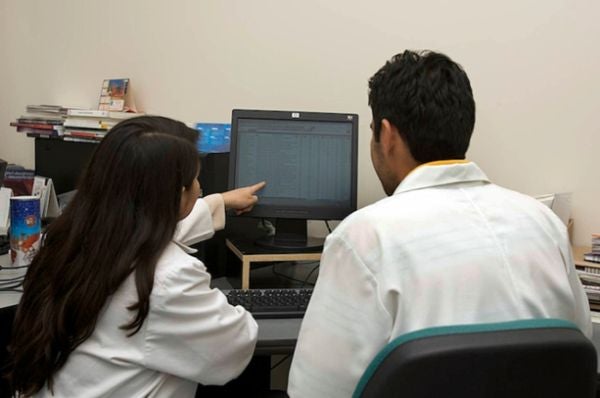
 The Pan American Health Organization (PAHO) and the EQUATOR Network's UK Centre recently renewed their memorandum of understanding to advance the Policy on Research for Health CD49/10 by increasing the value of research. A core aspect of the agreement is improving the reporting of research for health by using guidelines and other tools to increase accuracy and transparency.
The Pan American Health Organization (PAHO) and the EQUATOR Network's UK Centre recently renewed their memorandum of understanding to advance the Policy on Research for Health CD49/10 by increasing the value of research. A core aspect of the agreement is improving the reporting of research for health by using guidelines and other tools to increase accuracy and transparency.
Washington, DC, 4 May 2016 (PAHO) — The Pan American Health Organization (PAHO) and the EQUATOR Network's UK Centre recently renewed their memorandum of understanding to advance the Policy on Research for Health CD49/10 by increasing the value of research. A core aspect of the agreement is improving the reporting of research for health by using guidelines and other tools to increase accuracy and transparency. Under the agreement signed this month, PAHO and EQUATOR UK will extend their collaboration for five more years.

More than 6 years of fruitful collaboration
The EQUATOR Network has been PAHO's strategic partner since 2010. The Network, through its UK Centre, supports research users, producers, and sponsors in the Americas with a database of resources and tools to strengthen knowledge translation and enhance reporting standards and capacities. Together, they work for better public health and equity in the Americas.
The UK EQUATOR Centre and PAHO have developed a joint action plan for universities to help them deliver quality research reports, enhance their reputation with high standards in research reporting, and increase the impact of the research done by their scientists. The collaboration has also resulted in the development of resources and interfaces in Spanish and Portuguese on the EQUATOR Network website.
"Our experience in translating the EQUATOR Library for Health Research Reporting has been smooth and successful, and has resulted in effective growth in the reach of our Network," said Dr. Iveta Simera, Head of EQUATOR Program Development and Co-Director of the UK EQUATOR Centre. "Our work with PAHO so far has been innovative, impactful, and productive, and has allowed us to develop and benefit new audiences. We are excited to continue this partnership and further support public health and research in the Americas."
Guidelines help make study results fit for publication and practical use
Studies have shown that reports on the findings of health research often lack crucial information, making it difficult for peer reviewers, readers, and others to assess the validity and reliability of the results. This problem can largely be overcome through the use of common guidelines, which give authors a checklist of the important facts to include in their reports.
"Complete, accurate, transparent reporting is an integral part of responsible research conduct," said EQUATOR Network Chair Prof. Doug Altman. "Reporting guidelines like the PRISMA-Equity extension improve the quality of research reports and help research to better address the needs of public health." The PRISMA (Preferred Reporting Items for Systematic Reviews and Meta-Analyses) Statement is an evidence-based, minimum set of recommendations for reporting systematic reviews.
Renewed partnership to continue to promote responsible reporting of research for health

The renewed PAHO-EQUATOR partnership will continue to promote transparent, accurate reporting of research studies by providing resources, education, and training on the reporting of health research and use of reporting guidelines. The UK EQUATOR Centre will broaden the outreach of its website and training tools and resources, which now include Spanish and Portuguese interfaces. It will also support PAHO in promoting international reporting guidelines and improving the quality of publications and research reporting in the Americas.
"This partnership will increase the value of research and make research more impactful. We especially welcome the broader language reach and the coverage of topics such as the reporting of equity, which is so needed in public health. Furthermore, EQUATOR has contributed to advance PAHO and WHO policies on research for health addressing the mandates issued by our Member States," said Dr. Luis Gabriel Cuervo, Senior Advisor for Research Promotion and Development at PAHO/WHO. "These guidelines will help producers and users of research for health to do a better job."
Visit the EQUATOR Network interfaces in English, Spanish and Portuguese.
The Pan American Health Organization
PAHO is the leading international public health agency in the Americas and works with its Member States to improve the health and quality of life of people throughout the hemisphere. It serves as the Regional Office for the Americas of the World Health Organization (WHO) and is a member of the United Nations and Inter-American systems.
For more information about PAHO, visit www.paho.org. For more information on PAHO's Research for Health initiatives and Policy on Research for Health, visit www.paho.org/ResearchPortal.
The EQUATOR Network
The EQUATOR (Enhancing the QUAlity and Transparency Of health Research) Network is an international initiative to enhance the reliability and value of medical research literature by promoting transparent, accurate reporting of research studies. Its efforts are spearheaded by experts in research methodology, reporting, and publishing based in four regional centers.
The UK EQUATOR Centre collaborates closely with journals, reporting guideline developers, educators, and research funders. It provides in-person and online education and training activities to facilitate the use of reporting guidelines in health research writing. Its database of free online resources for authors, editors, and peer reviewers includes a collection of all available reporting guidelines for health research.
- To learn more about the EQUATOR Network, visit www.equator-network.org or contact Iveta Simera.
- 2015 EQUATOR Annual Lecture relevant to the Policy on Research for Health for the Americas
- PAHO Research Partnerships
- @EQUATORNetwork
- @pahowho
- @PAHOResearch



